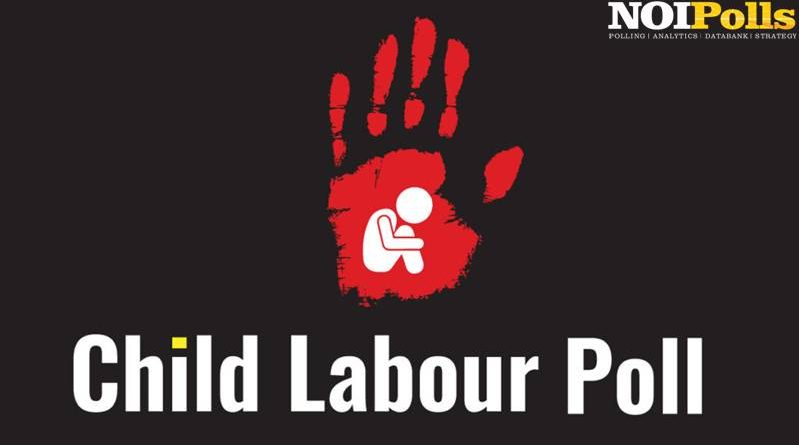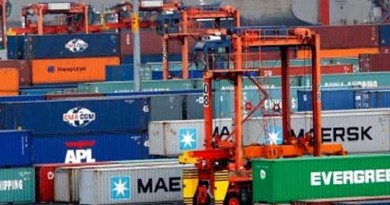Sixteen Years After Enacting the Child Rights Acts, Child Labour Remains a Major Issue in Nigeria – NOIPolls
A new public opinion poll conducted by NOIPolls in the week commencing June, 3rd, 2019 has revealed that most Nigerians (84 percent) believe that the issue of child labour is prevalent in the country. The poll further showed that 8 in 10 Nigerians claimed that they normally see children engage in various forms of labour in their respective localities. Data from International Labour Organization (ILO) reported that the number of working children under the age of 14 in Nigeria is estimated to be 15 million.[1] According to the Country Director of the International Labour Organization (ILO), Dennis Zulu, during a two-days’ workshop on ACCEL Africa on Friday May 3rd in Abuja, statistics revealed that about 43 percent of children in Nigeria aged between 5 to 10 years were involved in child labour.
Despite several measures to combat child labour, it continues to remain a great concern in Nigeria. The Child Rights Act which was passed into law in 2003 defines a child as one who is below the age of eighteen years and it categorically provides that such a child’s best interests shall remain paramount in all considerations. Sixteen years after being incorporated into Nigerian law, the child labour situation has remained a major issue as millions of children are still engaged in child labour activities. For instance, the poll revealed that children are often seen engaged in street hawking (58 percent), domestic work (11 percent) and street begging (10 percent) amongst other labour activities within their localities. Perception on street hawking showed that it is most predominant in the Southern region (79 percent on the average) than in the Northern region (43 percent on the average). However, opinions revealed that street begging and domestic work are highest in the Northern region than in the Southern region.
Interestingly, Nigerians blamed the prevalence of child labour on poverty (58 percent), parental neglect (16 percent) and bad economy (10 percent). Moreover, most of the respondents (27 percent) from the poll recommended that more jobs should be created as the rate unemployment in the country could be a contributing factor in the issue of child labour. In addition, 21 percent suggested that government should improve the economy, 18 percent advocated for free education amongst other recommendations. It is therefore, important that the government and concerned stakeholders’ work together to tackle the issue of child labour by implementing more programmes to eradicate poverty and improve the conditions of workers. Government should also create an enabling environment for small scale businesses to thrive in Nigeria in order to improve the economy and increase the employment opportunities.
Poll Background
The menace of child labour in Nigeria has indeed become a front burner issue in the country which requires urgent attention from all and sundry. Of utmost concern are the implications and the devastating eects of child labour on both the child and the society which is better imagined. It is worrisome that most parents are ignorant of such implications while others see it as the new norm for children to beg or hawk on the streets. Child labour refers to the exploitation of children under the age of 18 years through any form of work that deprives them of their childhood, interferes with their ability to attend regular school; and is mentally, physically, socially or morally harmful.[2] Such exploitation is frowned at and prohibited worldwide. It must be clearly stated that these prohibitions do not consider all work by children as child labour; exceptions include work by child artist, family duties and supervised training. Some activities like street hawking, domestic work, street begging, cargo loading, bus conductor, labourers, family business, farming, auto mechanic etc. done by children below the age of 18 years in order to survive are all termed as child labour
In Nigeria, many children are seen on a daily basis undertaking one form of labour or the other as enumerated above in order to make a living. Due to certain cultural and religious beliefs, some parents subject their children to child labour as a way to augment their income, others are of the opinion that it is as a result of high rate of poverty and unemployment bedevilling the country.
UNICEF’s recent report on child labour revealed that a staggering 15 million children under the age of 14 are working in various fields across Nigeria. Many are exposed to long hours of work in dangerous and unhealthy environments, carrying too much responsibility for their age. Working in these hazardous conditions with little food, small pay, no education and no medical care establishes a cycle of child right violations. Given the statistics above, Nigeria has a high number of children who are engaged in child labour and this calls for a decisive measure to curb this menace and also proffer a solution to it. Against this background, NOIPolls conducted a survey to gauge the opinions of Nigerians regarding child labour and various ways to curb it.
Poll Findings
The first question gauged the prevalence of child labour in Nigeria and findings from the poll are particularly worrisome as a large share (84 percent) of respondents nationwide believe that the issue of child labour is prevalent in Nigeria. This corroborates findings from International Labour Organization (ILO) which revealed that the number of working children under the age of 14 in Nigeria is estimated to be 15 million.[3]
Furthermore, trend
analysis revealed a 10 percent decline when current finding is compared with
the result obtained 2013. This suggests that concerned stakeholders could have
embarked on several awareness campaign that enlightened the general public on
the negative effects of child labour in the society at large. However, 84
percent is still on the high side hence more efforts need to made to further
reduce this figure drastically.

Subsequently, the poll revealed that the larger proportion of respondents (80 percent) disclosed that they have observed children engage in one form of labour in their respective localities. Analysis by region revealed that averagely, more respondents from the Northern region (84 percent) than the Southern region (74 percent) made this assertion. Trend analysis also revealed an 8 percent increase in the number of children seen engaged in various forms of labour when the 2019 result is compared to the findings obtained in 2016.

Trend analysis showed that the proportion of Nigerians who mentioned street hawking increased from 47 percent in 2016 to 58 percent in 2019 whereas, there is a decline in the number of those who cited domestic work (from 16 percent in 2016 to 11 percent in 2019).

Furthermore, poverty (58 percent), parental neglect (16 percent) and bad economy (10 percent) were the top three factors mostly blamed for the incidence of child labour in Nigeria. While poverty seems to be the major factor Nigerians attribute to the prevalence of child labour, Trend analysis revealed that this perception has declined in 2019 when compared to 2013.

Perceptions on how to curb the incidence of child labour in the country were gauged and a larger share of the respondents (27 percent) believe it is by creating more jobs. This will go a long in reducing poverty across the country, thereby reducing the need for children to compliment family income. 21 percent suggested that the government should improve on the economy while 18 percent recommended free education.

In conclusion, the poll has shown that the menace of child labour is indeed an issue that needs to be taken more seriously in order to reduce the effect on both the children and the society at large. The various government agencies and stakeholders need to be fully involved in dealing with the issues associated of child labour. The Child Right Act which was passed into law in 2003 in order to curb the menace of child labour has not been implemented by about 11 states in Northern Nigeria.[1] The different states that have not adopted the Act should be compelled upon to ensure that the Child Right Act is given utmost concern in order to curb the dangers associated with child labour.
Government should also create an enabling environment for small scale businesses to thrive in Nigeria in order to improve the economy and increase the employment opportunities. Furthermore, the role of education in reducing the issue of child labour cannot be over emphasized as education remains the basis of growth and development. Additionally, 5 percent of the respondents recommended birth control as a measure to curb child labour. Hence, parents should employ effective family planning methods to have limited number of children they can effectively take care of. Government on its part could put mechanisms in place to ensure public enlightenment and implementation of family planning while, health workers could also be saddled with the strategies for implementation.
Finally, the poll has clearly shown that the incidence of child labour is grossly under reported as 82 percent of the respondent are not aware of the reporting channels. Therefore, it is important for government agencies and concerned stakeholders to embark on an intense awareness campaign on the various ways to report the incidence of child labour.
Survey Method
The poll was conducted in the week commencing June 3rd, 2019. It involved telephone interviews of a random nationwide sample. 1,000 randomly selected phone-owning Nigerians aged 18 years and above, representing the six geopolitical zones in the country, were interviewed. With a sample of this size, we can say with 95% confidence that the results obtained are statistically precise – within a range of plus or minus 4.65%.
NOIPolls Limited, is the No1 for country specific polling services in West Africa. We conduct periodic opinion polls and studies on various socio-economic and political issues in Nigeria. More information is available at www.noi-polls.com or download our mobile app NOIPolls on your smartphone.
Disclaimer
This press release has been produced by NOIPolls Limited to provide information on all issues which form the subject matter of the document. Kindly note that while we are willing to share results from our polls with the general public, we only request that NOIPolls be acknowledged as author whenever and wherever our poll results are used, cited or published.
NOIPolls hereby certifies that all the views expressed in this document accurately reflect its views of respondents surveyed for the poll, and background information is based on information from various sources that it believes are reliable; however, no representation is made that it is accurate or complete. Whilst reasonable care has been taken in preparing this document, no responsibility or liability is accepted for errors or fact or for any views expressed herein by NOIPolls for actions taken as a result of information provided in this report. Any ratings, forecasts, estimates, opinions or views herein constitute a judgment as at the date of this document. If the date of this document is not current, the views and content may not reflect NOIPolls’ current findings and/or thinking.




